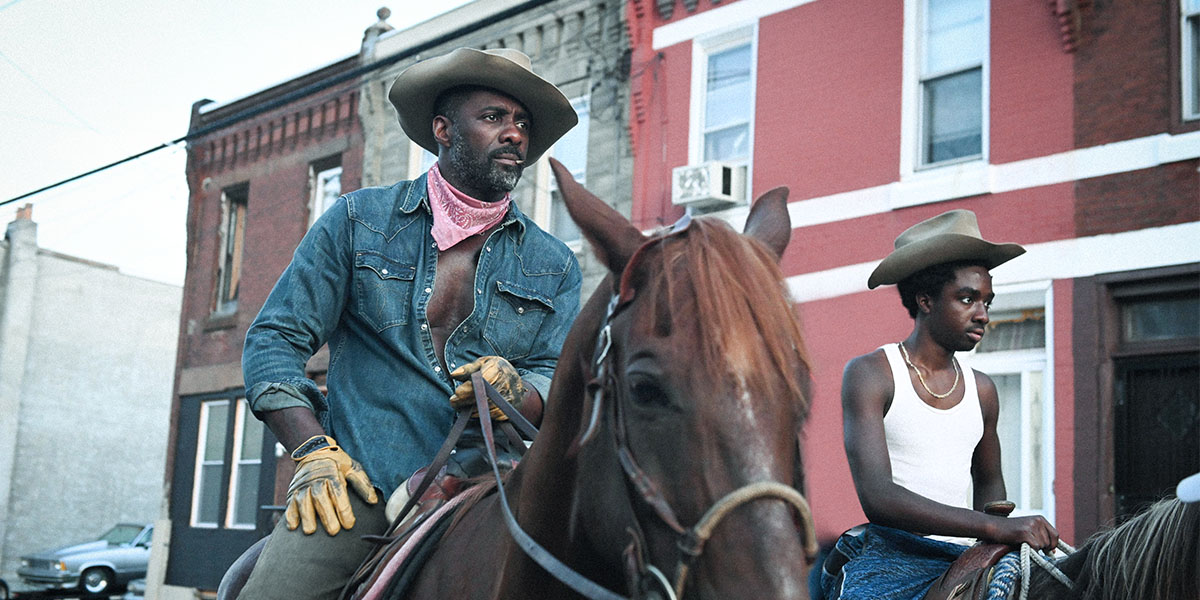What to Watch Verdict
Idris Elba and Caleb McLaughlin light up the screen as an estranged father & son who bond over a unique tradition.
Pros
- +
Both Elba and McLaughlin are excellent.
- +
The film is a testament to the power of imagery.
- +
All the scenes with the horses are gorgeous.
Cons
- -
It's a conventional, rather predictable narrative.
- -
A subplot featuring Jharrel Jerome doesn't work.
Idris Elba is, without a doubt, one of the most endlessly appealing actors working today. Few major on-screen stars have the sheer presence that he does, or the magnetism to allure audiences. He’s the sort of charmer who can make any middling movie that much better just by turning up (except for Cats, but nobody is perfect.) Still, even consummate charmers need good roles now and then, and Elba’s career has been a decidedly mixed one. All too often, it seems as though he’s been denied parts that are worthy of his range, characters that rely on more than pure charisma to get the job done. Step forward Concrete Cowboy.
Caleb McLaughlin from Stranger Things stars as Cole, a troubled teen who has been expelled from yet another school in Detroit. At her wit’s end, his mother unceremoniously dumps him in Philadelphia to be dealt with by his estranged father, played by Elba. Harp, however, isn’t particularly equipped to be the parent Cole needs, as his interests lie more in working with the horses he rides as part of the city’s legendary urban cowboy community. It doesn’t take long for Cole to fall under the spell of these animals.
As Harp, the unofficial head cowboy of this urban ranch, Elba feels right at home. With his instantly recognizable voice sounding just a little gruffer and with a vaguely mannered drawl, he gives Harp the aura of a man who is both of his time and of a moment in the past that may never have truly existed. He is both an appealing leader and an estranged father, someone who seems more comfortable mentoring other people (and horses) than his own kid. He’s so much more comfortable around his animals than his son, to the point where one of his horses lives in his pokey apartment.
Cole, who is essentially a stranger to Harp, is weighed down by his own barely-concealed rage and confusion over his short life, a kid who hates being treated like a kid but isn’t ready for adulthood in any way. Caleb McLaughlin may be best known for playing Lucas on Stranger Things but if Concrete Cowboy is any indication, he’s more than prepared for adult roles. As Cole, he carries himself with the weight of years of trodden-on expectations, his shoulders hunched over as if to protect him from the rest of the world. Once he starts to open up thanks to a wild horse named Boo, the change is almost euphoric.
Concrete Cowboy is both a love letter to the transformative power of man’s relationship with nature and to the legendary Fletcher Street Stables of Philly, and it is on these terms that the film most succeeds. The sheer sight of these majestic animals being ridden through the Philadelphia streets is one of immense power, as is the partnership between horse and human. As Cole finds his peace with Boo, it becomes emblematic of a wider force at play. It’s a kind of iconography that has been widely erased from both cinema and history at large. Indeed, this act of reclamation is at the heart of Concrete Cowboy. The characters often sit around a campfire in their Stetsons reminding one another that the original cowboys were Black and Latinx men, ones given the drudge work to perform by white ranch owners, and that the image of the proud John Wayne-style lone hero of the West was all Hollywood’s creation.
The basic narrative of Concrete Cowboy is relatively familiar. It’s a father-son bonding story told to the backdrop of a changing city that increasingly has no place for the stables or the Black residents who have called Philadelphia home for decades. A subplot involving the always-excellent Jharrel Jerome as a wayward kid who’s fallen onto the wrong side of the tracks doesn’t always work, although that’s no fault of Jerome, who remains one of the true talents of his generation. When the movie frees itself of its more conventional beats, its message is stronger and more effectively expressed. Concrete Cowboy is a testament to community and imagery, and that’s something that’s far more forceful than one mere movie can convey.
Concrete Cowboy is part of our TIFF coverage.
The latest updates, reviews and unmissable series to watch and more!
Kayleigh is a pop culture writer and critic based in Dundee, Scotland. Her work can be found on Pajiba, IGN, Uproxx, RogerEbert.com, SlashFilm, and WhatToWatch, among other places. She's also the creator of the newsletter The Gossip Reading Club.


